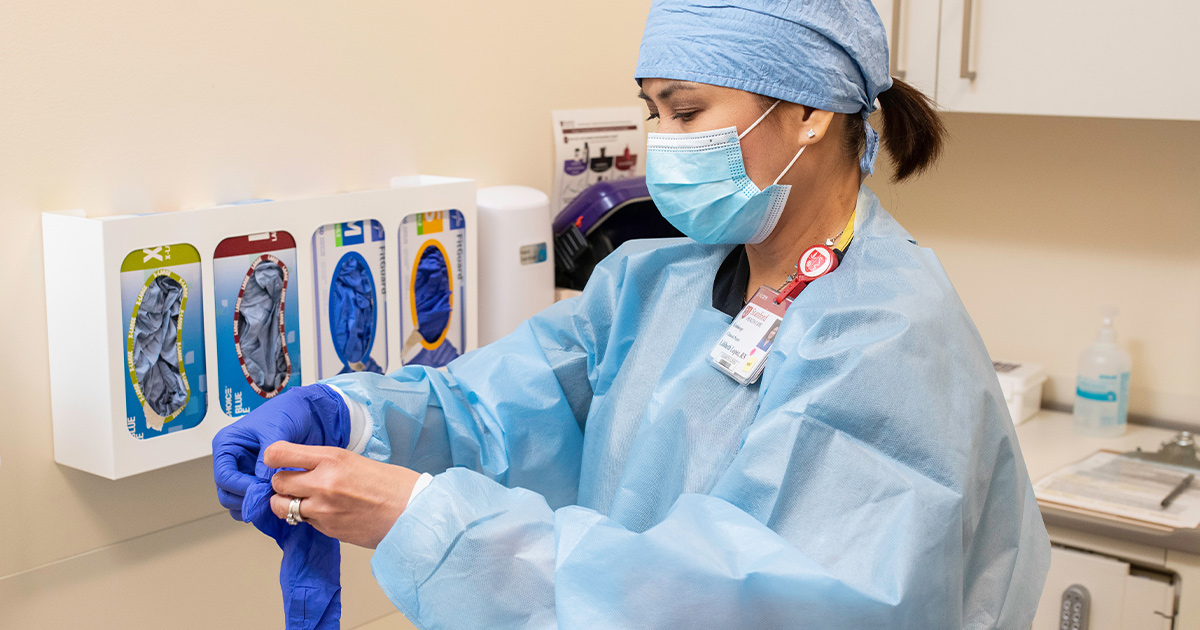Pain Management
Part of Tri-Valley

Pain Management Center
At Stanford Health Care Tri-Valley, our complete pain management services help you reduce pain, build resilience, find ways to become more active, engage in meaningful aspects of your life and meet your lifestyle goals. Our holistic approach addresses pain from all angles with pain-relieving medication, behavioral strategies, physical and occupational therapies, and other complementary treatments in a compassionate environment.
What We Offer You for Pain Management Care
- Specialized expertise in treating all types of acute and chronic pain, including arthritis, back pain, migraine, fibromyalgia, facial pain, and pelvic pain. Go to Conditions Treated
- Personalized treatment using minimally invasive pain-reducing techniques, psychotherapy, and physical therapy tailored to your condition, needs, and goals. Go to Treatments
- Team-based approach to diagnosis and treatment of pain with highly skilled pain management physicians, nurses, rehabilitation specialists, and social workers. Go to Your Care Team
- Complete support services, including medical acupuncture to help you reduce pain and minimize medication use. Go to Support Services
- Ease of access, with innovative care in your community and convenient appointments with your pain management team. Go to Accessing Care
Our skilled specialists use a wide range of leading-edge treatments to reduce pain and help you return to meaningful activities.
Arthritis
Our arthritis specialists treat pain from:
- Osteoarthritis: The most common type of arthritis, causing wear and tear in the joints
- Psoriatic arthritis: Chronic, inflammatory condition that affects people with the skin condition psoriasis
- Rheumatoid arthritis: An autoimmune disease that causes joint pain and swelling
Back and neck pain
We address the many causes of back and neck pain, including:
- Abnormal growths, such as a tumor
- Herniated or slipped disc
- Overuse
- Muscle tears
- Spinal injuries due to trauma
Cancer pain
You may experience pain when cancer spreads to your bones or a tumor presses on your bones, nerves, or organs. Cancer treatments, such as radiation and chemotherapy, can also cause pain. Our integrated approach to treatment can help you find relief.
Chronic migraines and headaches
We treat all types of headaches, including:
- Migraine: Nausea, vomiting, and sensitivity to light, often with throbbing pain only on one side of your head
- Tension headache: Pain or discomfort in your head, scalp, or neck
- Hypnic headache: A rare headache that only occurs at night and typically lasts 15 to 60 minutes
- Cluster headache: A very painful headache that usually lasts 20 minutes to two hours, several times a day for days or weeks
- Chronic cerebrospinal fluid leaks: Painful headaches when the clear liquid that surrounds the brain or spine leaks through the nose or ears
Chronic postoperative pain
After surgery, some people experience pain due to nerve or tissue damage or other factors. A range of options can provide relief while you heal or for the long term.
Facial pain
Whatever the cause, facial pain can interfere with your life. Our team pinpoints the root cause and develops a comprehensive care plan for you.
Widespread, persistent musculoskeletal pain, chronic fatigue and fibromyalgia
Our specialists address pain that occurs in your muscles, bones, ligaments, or tendons and feels like muscle strain, whole-body aches, and fatigue or brain fog. Medication, procedures, and behavioral health solutions provide holistic treatment.
Nerve pain
We treat different types of nerve pain, including:
- Complex regional pain syndromes (CRPS): Intense chronic pain, swelling, and changes in skin color that typically occur in your hand, arm, leg, or foot (but can occur anywhere)
- Peripheral neuropathy: Pain, numbness, or muscle weakness from damaged or destroyed nerves outside your brain and spinal cord, sometimes due to diabetes
- Post-herpetic neuralgia: Burning or sharp nerve pain after having shingles, a virus that creates a rash on your skin
- Thoracic outlet syndrome: Pain or numbness in your neck, shoulder, or arm from nerve compression in the lower neck and upper chest
Pelvic pain
When pelvic pain persists, our specialists perform various diagnostic tests to target the root cause. Many different concerns and conditions can cause pelvic pain, such as abnormal growths on the uterus (uterine fibroids).
Because pain is complex, we offer a wide spectrum of medical, behavioral, and physical rehabilitation treatments. We begin with a comprehensive evaluation to pinpoint the cause of your pain. We use innovative diagnostic tools and take care to listen to your concerns and experiences around pain.
Our team of specialists designs a personalized program to help you reduce pain, return to your daily activities, and meet your individual goals. Your treatment might include a combination of physical therapy, mental and behavioral treatments, and medications or procedures to offer the best results. We are here to support and empower you in feeling better and living a fulfilling life.
Medications & Procedures
Through our partnership with Stanford Health Care, we offer advanced medications and minimally invasive methods to diagnose and reduce pain. In many cases, these treatments support you in participating in other interventions, such as physical therapy. These safe, state-of-the-art treatments include:
Epidural steroid injections
This injection delivers pain-reducing medication into a small space in your back or neck. It usually takes three to five days to take effect. Overall, each person experiences pain relief differently. Some people may be pain free for several months or even longer. Others might not experience much relief.
Intravenous (IV) lidocaine infusion
You receive lidocaine, a pain-numbing medication, through your veins to relieve chronic pain, headache, or postoperative pain.
Intrathecal programmable pump placement
Your doctor inserts a medical device under the skin to deliver pain-relieving medication directly into the spinal fluid. This therapy can treat spinal cord injuries or chronic, severe pain that has multiple causes.
Neuromodulation
This procedure sends electrical signals to the spinal cord to reduce chronic pain in the back, arms, or legs.
Nerve blocks
An injection of pain-relieving medication close to a nerve or nerves can reduce inflammation and instantly block pain. Our specialists offer different nerve blocks, depending on the source of your pain, such as:
- Occipital nerve block to treat a type of tension headache
- Hypogastric plexus block to relieve chronic pelvic pain
- Gasserian ganglion block to relieve chronic facial pain
- Brachial plexus block to relieve chronic arm and shoulder pain
Pre-operative pain management
We work with you to develop a personalized plan before, during, and after surgery to:
- Minimize pain
- Maximize comfort
- Reduce medication side effects
Psychotherapy
Psychotherapy is a critical part of pain management. In addition to treating physical pain, it’s important to address the very real psychological and emotional aspects. Our therapists have extensive experience in working with individuals dealing with different types of pain.
We combine our expertise with sensitivity and compassion, knowing that living with pain often takes a heavy toll. We attentively listen and partner with you to effectively manage your pain and live a more satisfying life.
Working with an Stanford Health Care Tri-Valley therapist can help you:
- Identify and minimize triggers, such as stress
- Learn relaxation and meditation techniques
- Address feelings of sadness, hopelessness, and anxiety
- Adopt more helpful thoughts around pain
- Make healthy lifestyle changes
- Improve sleep
Physical & Occupational Therapy
For many people, physical therapy and occupational therapy are an essential part of comprehensive pain management. Specialists work closely with you to create a personalized plan that aligns with your values and goals.
Physical therapy
Our physical therapists help you to minimize pain and maximize function. They may work with you to create a custom exercise/activity program to help explore how to become more active in an effort to reteach the body's protection response to allow for more freedom of movement, activity and exercise.
They also understand that dealing with pain can lead you to feel anxious about moving your body. Our physical therapists support you in navigating these worries and regaining movement as pain decreases.
At Stanford Health Care Tri-Valley, we also offer a persistent pain education program. In four 90-minute sessions, you’ll learn from a team of health professionals, including a physical therapist and certified therapeutic yoga instructor. The program explores building healthy notions of pain and developing strategies to help safely become more active. You’ll also learn to rethink pain, build your resilience and boost your quality of life.
Occupational therapy
Our occupational therapists support you in learning safe ways to perform daily activities that are important to you. They also may assist you with:
- Correcting unhelpful movement patterns you may have developed due to pain
- Learning to pace activities to avoid flare-ups, including taking breaks and changing how you do certain activities
- Practicing techniques to relax your muscles and your mind
Clinical Trials
Clinical trials are research studies that evaluate a new medical approach, device, drug, or other treatment. As a Stanford Health Care patient, you may have access to the latest, advanced clinical trials.
Open trials refer to studies currently recruiting participants or that may recruit participants in the near future. Closed trials are not currently enrolling, but similar studies may open in the future.
Your Pain Management Care Team
At Stanford Health Care Tri-Valley, we assemble a team of highly skilled, compassionate specialists to precisely diagnose and treat your pain. We strive to provide you with comprehensive treatment in a warm, attentive environment.

Your Doctors
Neurologists
Our neurologists are fellowship trained to manage disorders of the nervous system. They diagnose and treat all conditions and diseases involving the central and peripheral nervous system, including nerves, nerve coverings, blood vessels, and affected muscles.
View All NeurologistsPain Management Specialists
Pain management specialists help patients decrease pain and suffering, return to a maximum level of functioning and independence, and restore quality of life.
View All Pain Management SpecialistsPsychologists
A psychologist is a licensed mental health professional (Ph.D. or Psy.D.) who specializes in the evaluation, diagnosis, and treatment of mental health.
View All PsychologistsPhysiatrists
These medical doctors specialize in diagnosing and treating different types of pain using medication and physical therapy. They’ve completed training in the field of physical medicine and rehabilitation.
View All Physiatrists
Extended Care Team
Advanced Practice Providers (APPs)
Our team of APPs includes nurse practitioners, physician assistants, and clinical nurse specialists with extensive experience treating people with a wide range of pain conditions.
Physical Therapists
These healthcare professionals help you reduce pain and improve movement through personalized exercise, movement exploration and activity programs and hands-on techniques as needed. They provide guidance in developing an individualized gradual, progressive, graded exercise/activity program to help you reach your goals.
Social Workers
Our social workers support you in coordinating all aspects of your pain management care.

Support Services
We help with the details so you can focus on your health and wellness. We offer a range of patient services and helpful information to coordinate the various aspects of your care:
We help with the details so you can focus on your health and wellness. We offer a range of patient services and helpful information to coordinate the various aspects of your care:
At Stanford Health Care Tri-Valley, we understand that accessing care can sometimes feel overwhelming when you are dealing with a pain condition. We strive to simplify the entire process by providing leading-edge services close to home.
When possible, we coordinate appointments with your pain management team so that you can see multiple providers in one visit. We are always happy to answer questions about your treatment and care.
Convenient care where you live and work
- Insurance and billing: We accept most insurance plans. Please check with your health plan to confirm coverage.
- Self-pay pricing: Available by contacting Patient Financial Services at 1-800-549-3720, Monday through Friday, 8:00 am to 4:00 pm.
- MyHealth: Our MyHealth system allows you to access your records and test results from home, as well as communicate with your doctors.
